- Home
- Isaac Hooke
Refurbished Page 7
Refurbished Read online
Page 7
The insurgents were mocking not just the Cicadas with those drawings, but the governments that produced them. The foreign fighters had realized long ago that it cost our country trillions of dollars to continue waging this war, whereas for them the only cost was their measly lives. They were eager to keep us involved in the region; their endgame seemed to be the bankruptcy of all countries involved. But we had a long way to go, yet—they didn’t realize that the war actually helped our economy, and spurred technological innovation. So, as long as the terrorists continued to flock here from around the world, Eric and his team would continue blowing them up.
Insurgents had taken over the city a few weeks ago, and used it as a base of operations to stage raids and terrorist attacks against other nearby cities and army outposts. The Brass had sent in Second Platoon, and their associated support units, to deal with the threat. They called themselves a “platoon,” but when including the support troops under their command, in reality they were more like a company, or a battalion, at least as Eric had known them in his time.
Senior Command didn’t want to bomb the city outright—intel reported that civilians were still holed up in different apartments and residences throughout Urdani. Plus the Russians and Chinese both had a presence on the eastern side of the town, where they were pushing the insurgents inward from their own forward operating bases.
Eric and the Bolt Eaters meanwhile were applying pressure from the other side, so that insurgents faced attacks on multiple fronts.
He resided in an apartment building, at a bedroom in the upper level. He’d shoved the bed against the wall beside the window, and lay flat on the mattress, his rifle on a bipod as he aimed into the street past the opposite bottom corner of the window. He didn’t actually need that bipod, because his robotic hands would keep the weapon steady on its own, but the mind dump he had received had trained him to always use it, so he did.
His rifle was sheathed in the same LEDs as his polycarbonate skin, allowing both the weapon and his body to assume a stealth coloration that blended him in with the background.
Frogger had shoved another mattress into the room, and had managed to squeeze it in between the window and the far wall. He mirrored Eric’s position to watch the street in the opposite direction. Neither Eric nor Frogger needed a spotter—they carried all the equipment they needed aboard their bodies to range find, measure wind speed, and so forth; and they made any required calculations for distance, slant range, and so forth in their heads, or offloaded the calculation to their Accomps. Of course, the latter calculations weren’t needed for the laser mode of the weapon, but came in handy if he needed to deploy a Vision Round at a distance with any degree of accuracy.
Brontosaurus, meanwhile, acted as flanker, and covered the rear approach to the room, aiming his heavy guns into the hallway outside. Six-barrel “Beast” H134 models, those two big weapons were locked into the mounts built into Brontosaurus’ forearms. The Beasts looked similar to Gatling guns, or the mini guns one might find mounted to early twenty-first century gunships. Without those heavily modded biceps, it was doubtful Brontosaurus would have been able to support the added weight: Eric had tried to mount a Beast once and he certainly couldn’t do it. Perhaps it might seem odd to build a barrel into a laser weapon, but even lasers could pulse only so fast, and this design allowed the Beast to keep up a steady stream of punishment, strong and rapid enough to penetrate tank armor, while minimizing cool down intervals.
Both Brontosaurus and Frogger had switched to stealth mode, their LEDs blending them into the background like Eric. Something like LIDAR or thermal imaging would easily penetrate their ruse, but only a few insurgents had weapons tech beyond automatic rifles.
The three Bolt Eaters had moved to this latest hide only three hours ago. Previously, they had occupied two other buildings, but had relocated with the team as the enemy retreated toward the city center. So far, they’d been on duty for ten hours. They expected to remain so for the next thirty or more, until the city was free of insurgents. It was typical of the missions they’d gone on during the current deployment. They didn’t need rest, after all. They were robots, restrained only by the limitations of their power cells. If they ever prematurely drained those cells by operating in high time awareness mode, they’d have to recharge. To that end, on the floor beside Eric was a heavy battery pack, shaped like a toolkit with a handle, that he’d hauled with him when moving between locations. With that pack, he could recharge his cell without leaving his hide, nor his post. If he exhausted the pack, however, he’d have to make his way down to the support carrier and plug in to a recharge port. It happened.
There was no connection to the 7G Milnet out here in the Caucasus Mountains, so the team formed their own adhoc 7G network with the help of Ravens perched on the rooftops, and the Predators flying back and forth out of sight far overhead. The platoon was able to tap into the slower network the insurgents used to communicate, which allowed the team to track the radio chatter, but not much else: so far, they hadn’t been able to penetrate the encryption.
Bipedals stood outside different buildings below, Breachers and Savages, part of the group assigned house-to-house clearing duties. Other Savages were crouched on rooftops nearby, ready to provide fire support. Ravager mechs meanwhile held down the intersections on either side, acting as defense platforms. A couple of Abrams tanks roamed the streets beyond, escorted by Savages. They weren’t actually Abrams, of course… the army wasn’t using a two hundred year old tank platform. But that was how Eric’s linguistic engine handled the translation from Modern English into Young English whenever someone mentioned the tanks.
All of those robots, from the drones overhead to the mechs and smaller robots in the streets, were controlled by the different team members, as defined by their various role. As a sniper, Eric wasn’t in charge of any units. It was too bad. Controlling the house-clearing robots would have been a lot more interesting than sniping, but hey, he had no say in the matter.
Besides, he didn’t have the extra power cells he’d need to maintain the slower time sense that came with operating so many units. During the pre-deployment VR training sessions, he’d had plenty of opportunities to try out the different robot swarms, and he found it similar to playing a real-time strategy game, except that it was actually slower than real-time. More like one-third time, in fact, with every three seconds he experienced the same as one in the real world. When things got hectic during the training sessions, he usually slowed things down even further still.
But all of that was moot at the moment.
I’m just a grunt. In charge only of the rifle in front of me.
As a corporal, Brontosaurus was officially in charge of the small sniper team formed by himself, Eric, and Frogger. Eric was duty-bound to obey every order Brontosaurus, or even Frogger, gave him.
Yup. I officially miss my old life.
Not that he cared all that much, given how muted his emotions were.
Every one of the previously described units was capable of autonomous operations, but the onboard AIs only took over if there was a comm failure. When that happened, the machines were essentially useless. Predators would retreat if necessary, moving out of harm’s way, while ground units took cover, putting their rifles away: the Rules of Engagement prevented the autonomous units from firing on their own. If any of those machines somehow managed to let off a shot on its own, the lawyers would be sent in.
The insurgents occasionally launched robots of their own, usually off-the-shelf varieties they had brought with them into the country, or purchased from the nearby city of New Kurdistan. They included small drones meant for aerial photography, robot assistants, and companions, like autonomous pet dogs. Sometimes those drones and dogs were jury-rigged to carry lasers or improvised explosive devices, and could cause some damage if they weren’t taken down quickly.
“You know, I’m still thinking of that girl we saw on the street earlier,” Brontosaurus said.
“Why,
you mean the one whose face you saw for like a half second?” Frogger asked. “Before she covered it again with her veil?”
“Yup,” the heavy gunner replied. “If she didn’t live in this country, she’d be a model. She has no opportunities here.”
“Maybe you should be her knight in shining armor bronco boy,” Eric said as he scanned the street, rooftops, and windows of the buildings below. “Saddle on up and show her what you’re made of, rescuing her from the streets of Urdani like the real man you are.”
“Like I’ll ever find her now,” Brontosaurus said. “She’d have no interest in me, anyway. I’m a machine.”
“What about those legendary dildonic attachments I’m always hearing about,” Eric said.
“Yeah, I actually bought one of those,” Frogger said. “You can borrow mine.”
“That’s gross,” Brontosaurus said.
“Uh, you never told me you bought a strap-on,” Eric told Frogger. “That doesn’t seem like me.”
“Hey, we’ve been known to have our urges now and again,” Frogger said. “Don’t tell me you haven’t recreated Molly in VR.”
Eric momentarily looked away from his scope. Frogger was gazing right at him. “You know me too well. So how well did it work? The dildonic attachment?”
“Terrible,” Frogger said. “The sex is much better in VR. The damn thing broke in the middle of the act.”
“Was it a fellow robot you were doing, or a human?”
“A human of course,” Frogger said.
“Nice,” Eric said. “I didn’t think humans would ever be interested in us.”
“We have our groupies,” Brontosaurus said. “Especially us military bots.”
“Who would have thought.” Eric moved his eye to his scope and returned his attention to the street below. “Despite the negatives, being a robot has all sorts of advantages. We have groupies. We can change our time sense. We don’t have to worry about diseases. Or things like diarrhea.”
“That’s a big one for me,” Brontosaurus said.
“I remember last time I was here as a human,” Frogger told Brontosaurus. “I had the shits constantly. As did most everyone else. Man, the pain… it would come and go, and no matter how hard you clenched, you just couldn’t hold the burning liquid in. I tell you, the water here, it was full of bacteria incompatible with our guts. I would have hated to have been cooped up in an armored vehicle. I heard some stories about the people who worked inside tanks: things got real messy inside, real quick. Ask Scorp. I’m not lying, am I?”
During training, the team had assigned Eric the callsign “Scorpion,” or “Scorp” for short, because of the way he liked to impale targets on any spikes available in the environment, such as steeples at the tops of buildings, or a protruding piece of rebar from a crumbled building. For a while there it had become his signature move, but he’d soon grown bored of it. However, the nickname had stuck. Slate liked to warp the callsign into Scarface, though how he’d derived that from Scorpion, Eric didn’t know.
“Nope, we didn’t have fun when we were here,” Eric said. “I clearly recall visits to the outhouses of the Camp Denver CHU farm. You remember?”
“Oh yeah, the worst,” Frogger said.
“They were a pigsty, essentially,” Eric said. “I can still smell the baked feces and urine inside my virtual nostrils. And it was so hot in there… you’d think they’d build in ventilation, if not for the smell, then the heat. Nope. And then the flies… no. Just no. I remember one time, after having a particularly bloody diarrhea, I stumbled outside, flies and filth covering my leg, stars speckling my vision, and I lay down on the ground, naked, too sick to get up. Good times.”
“Yikes,” Brontosaurus said. “I’m glad I wasn’t born in the early twenty-first century.”
“Yeah, like I said, being a robot has its advantages.” Eric paused. “Though I guess we’re not entirely immune to diseases, are we…”
“How so?” Brontosaurus asked.
“Well, what about computer viruses?” Eric replied. “That’s a kind of disease, isn’t it?”
“In a way,” Brontosaurus said. “But we’ve got anti-virus programs running. And we get updates pushed through on the Milnet, in case you hadn’t noticed.”
“I noticed,” Eric said. “At first I was reluctant to accept them. I used to have big problems with Windows automatically updating on me, and messing up my video drivers. Or my sound card. What a nightmare.”
“Windows, huh?” Brontosaurus said.
“Before your time,” Eric said. “Anyway, I finally took the leap and turned on auto-update. My Accomp has been downloading the patches automatically and installing them in the background as they come in. So far, so good. But one of these days I’m expecting to wake up to find one of my subsystems disabled. Like Bullet Time no longer works. Or I can’t move my body. Something like that.”
“Never happen,” Brontosaurus said. “You haven’t seen the rigorous testing process the military goes through before releasing each patch. They have a rig containing a hundred versions of each robot model. Cicada A1s. Cicada A21s. Savages. You name it. They run each update on the robots for a week before they give it the stamp of approval. Unless of course they’re patching some critical zero day that an enemy is using to hack our systems. Then the patch goes live a lot faster. I admit there have been problems with some of those.”
“Like what kind of problems?” Eric said.
“Probably better that you don’t know,” Brontosaurus said.
“Ignorance is bliss,” Eric said.
He trained his cross-hairs on a gypsum-outlined doorway. It looked like there was a rifle muzzle peering out from the opening.
Ordinarily the Rules of Engagement would have prevented Eric from firing first—in general, he had to confirm he was under attack beforehand. But the lieutenant had lifted that particular rule from the Mind Refurbs before the mission, as he often did when the Bolt Eaters were sent out on house clearing operations.
Eric double-checked that no friendlies were in the area on his overhead map, then he adjusted his aim, extrapolating the position of the center of mass of a typical human being that might be holding that rifle, and squeezed the trigger.
An insurgent dropped to the ground. The laser had cauterized the wound, preventing blood from pooling underneath the body.
“Eighty-two,” Eric said.
“Damn it,” Frogger said. “Why do you always end up with the better side, Scorp?”
“The luck of the draw,” Brontosaurus said.
“It’s not luck,” Eric said. “Skill.”
He scanned the windows above the doorway of the same building, but couldn’t see past the slats covering the panes.
“You know, I remember a time when competing for a kill count would have disgusted me,” Eric said.
“Yeah, but that was when we were human,” Frogger said.
“Do you ever miss it, Bronto?” Eric asked, searching for his next target.
“What?” Brontosaurus replied. “Being human?”
“Well yeah,” Eric said.
“Can’t say that I do,” Brontosaurus told him. “I’m far stronger than I ever was as a man. Far faster.”
“But what about the chance to feel another human being?” Eric said.
“I got VR,” Brontosaurus said. “With all the enhancements: I have the senses of taste, smell, sight, sound, and touch. I’m anatomically correct, with my member jacked right into my pleasure center. Sex, orgasm, you name it, I can feel it all. What we have here, as Mind Refurbs, is the Golden Age. We combine all the best parts of being human and robot, with none of the baggage.”
“Except we can’t really feel anymore...” Eric said. “Emotionally. Sure, we have pleasure, but the lieutenant makes us keep everything else dialed down. If we can convince him to override that setting, or find a way to enable our emotions ourselves—”
“Trust me, you don’t want to feel, bro,” Brontosaurus said. “Emotions were th
e worst part about being human. That baggage I was talking about earlier? I was referring to feelings of course. Back when I was a man, between the deployments and the woman I was seeing, I was left an emotional wreck. Ever heard of PTSD? Or whatever they call it these days? I was messed up. It was probably a good thing a sniper finally put me out of my misery.”
“You really think you’ll be able to do this job if you can feel?” Frogger told Eric. “The guilt would destroy us, and you know it.”
“I suppose you’re right,” Eric said. “It was a nice thought.”
Just then Eric sighted an insurgent in one of the windows. The bearded man forced the shutters to the side, enough to squeeze half his torso through. He held a launcher over one shoulder.
It was aimed directly up at Eric.
Eric switched to Bullet Time, but it was too late: by the time he had lined up his cross-hairs and released the shot, the insurgent had already launched the rocket propelled grenade.
“Incoming!” Eric yelled.
8
Eric increased his time sensitivity to max, so that the approaching missile moved no faster than a car traveling at ten miles and hour. He got up. His body seemed to move sluggishly—his mind always performed faster than his body at the highest speed. He retreated from the window, moving all too slowly. Across from him, Frogger moved at a similar pace. Brontosaurus meanwhile had already vacated the room—the heavy gunner’s modded servomotors were capable of much faster movement.
Eric and Frogger both crossed the hallway threshold as the grenade impacted the window frame. A cloud of explosive vapors and shrapnel expanded outward rapidly.
The cloud enveloped him, and he was hurled from the room by the explosive force of the detonating grenade. He used Bullet Time to control his landing and dodge shrapnel as best as he was able: he smashed into a side wall before crashing to the floor in the hallway.
Eric dismissed Bullet Time and the world snapped back to normal around him.

 Warden 2
Warden 2 Devastator
Devastator Warden 4
Warden 4 Emperor
Emperor Mech
Mech Conqueror
Conqueror Fighter
Fighter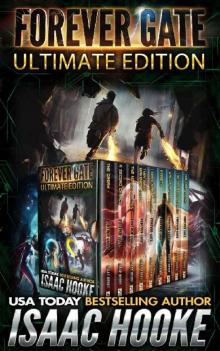 The Forever Gate Ultimate Edition
The Forever Gate Ultimate Edition Defiler
Defiler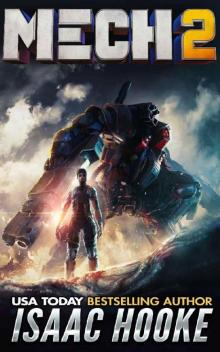 Mech 2
Mech 2 Warden 3
Warden 3 Warden 1
Warden 1 Mech 3
Mech 3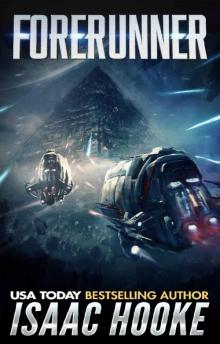 Forerunner
Forerunner The Alliance (AI Empire Book 2)
The Alliance (AI Empire Book 2) Breaker (Monster Tamer Book 1)
Breaker (Monster Tamer Book 1) Bender of Worlds
Bender of Worlds The Pendulum Swings (The Forever Gate Book 8)
The Pendulum Swings (The Forever Gate Book 8) The Link
The Link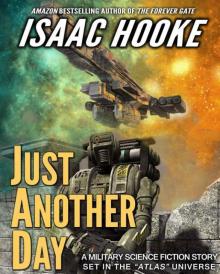 Just Another Day
Just Another Day Star Warrior
Star Warrior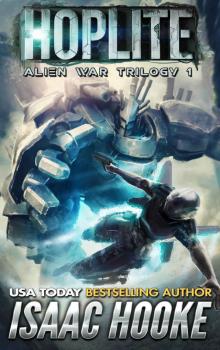 Alien War Trilogy 1: Hoplite
Alien War Trilogy 1: Hoplite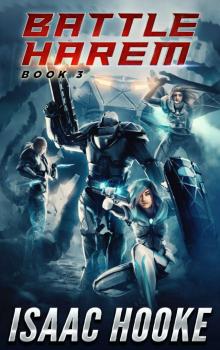 Battle Harem 3
Battle Harem 3 The Ethan Galaal Series: Books 1 - 3
The Ethan Galaal Series: Books 1 - 3 Reloaded
Reloaded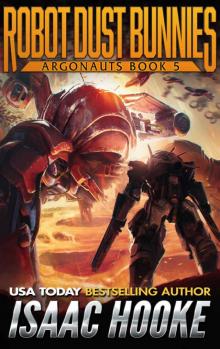 Robot Dust Bunnies (Argonauts Book 5)
Robot Dust Bunnies (Argonauts Book 5) Battle Harem
Battle Harem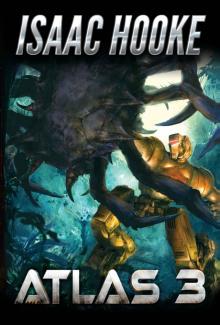 ATLAS 3 (ATLAS Series Book 3)
ATLAS 3 (ATLAS Series Book 3) Argonauts 2: You Are Prey
Argonauts 2: You Are Prey Worlds at War (A Captain's Crucible Book 5)
Worlds at War (A Captain's Crucible Book 5)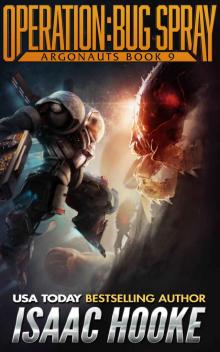 Operation: Bug Spray (Argonauts Book 9)
Operation: Bug Spray (Argonauts Book 9)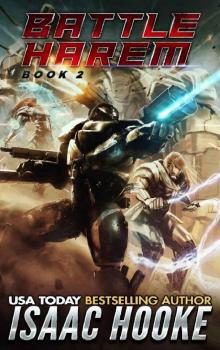 Battle Harem 2
Battle Harem 2 Redeemed (Bolt Eaters Trilogy Book 3)
Redeemed (Bolt Eaters Trilogy Book 3)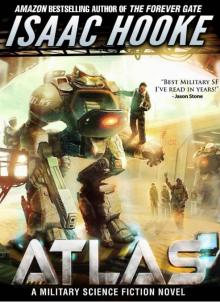 Atlas
Atlas Argonauts 1: Bug Hunt
Argonauts 1: Bug Hunt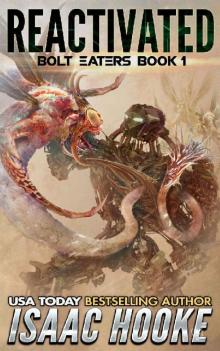 Reactivated (Bolt Eaters Trilogy Book 1)
Reactivated (Bolt Eaters Trilogy Book 1)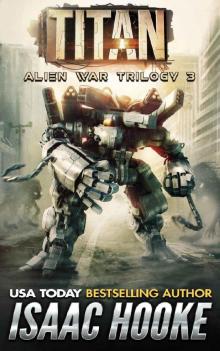 Alien War Trilogy 3: Titan
Alien War Trilogy 3: Titan Flagship (A Captain's Crucible #1)
Flagship (A Captain's Crucible #1)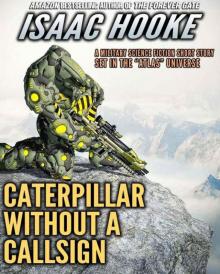 Caterpillar Without A Callsign
Caterpillar Without A Callsign The Forever Gate
The Forever Gate He Who Crosses Death (Star Warrior Quadrilogy Book 3)
He Who Crosses Death (Star Warrior Quadrilogy Book 3) Reforged (Bolt Eaters Trilogy Book 2)
Reforged (Bolt Eaters Trilogy Book 2) Refurbished
Refurbished Reloaded (AI Reborn Trilogy Book 2)
Reloaded (AI Reborn Trilogy Book 2) He Who Crosses Death
He Who Crosses Death Explorations: First Contact
Explorations: First Contact Planet Killer (A Captain's Crucible Book 4)
Planet Killer (A Captain's Crucible Book 4)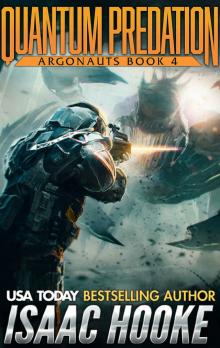 Quantum Predation (Argonauts Book 4)
Quantum Predation (Argonauts Book 4) Clandestine-IsaacHooke-FreeFollowup
Clandestine-IsaacHooke-FreeFollowup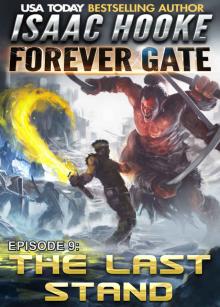 The Last Stand (The Forever Gate Book 9)
The Last Stand (The Forever Gate Book 9)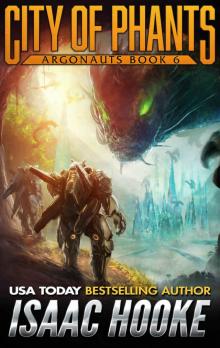 City of Phants (Argonauts Book 6)
City of Phants (Argonauts Book 6)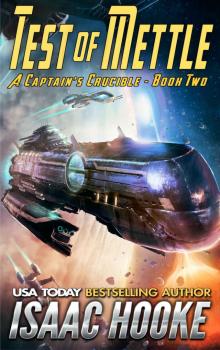 Test of Mettle (A Captain's Crucible Book 2)
Test of Mettle (A Captain's Crucible Book 2) Cradle of War (A Captain's Crucible Book 3)
Cradle of War (A Captain's Crucible Book 3)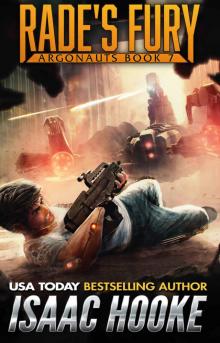 Rade's Fury (Argonauts Book 7)
Rade's Fury (Argonauts Book 7) Rebirth (The Forever Gate Book 6)
Rebirth (The Forever Gate Book 6) The Forever Gate Compendium Edition
The Forever Gate Compendium Edition Mechs vs. Dinosaurs (Argonauts Book 8)
Mechs vs. Dinosaurs (Argonauts Book 8)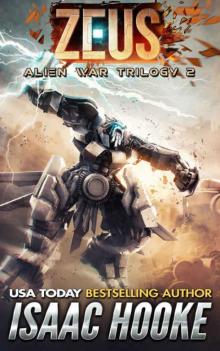 Alien War Trilogy 2: Zeus
Alien War Trilogy 2: Zeus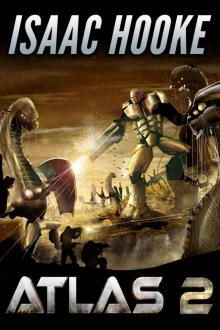 ATLAS 2 (ATLAS Series Book 2)
ATLAS 2 (ATLAS Series Book 2)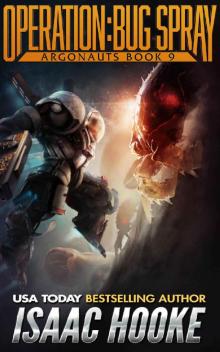 Operation_Bug Spray
Operation_Bug Spray